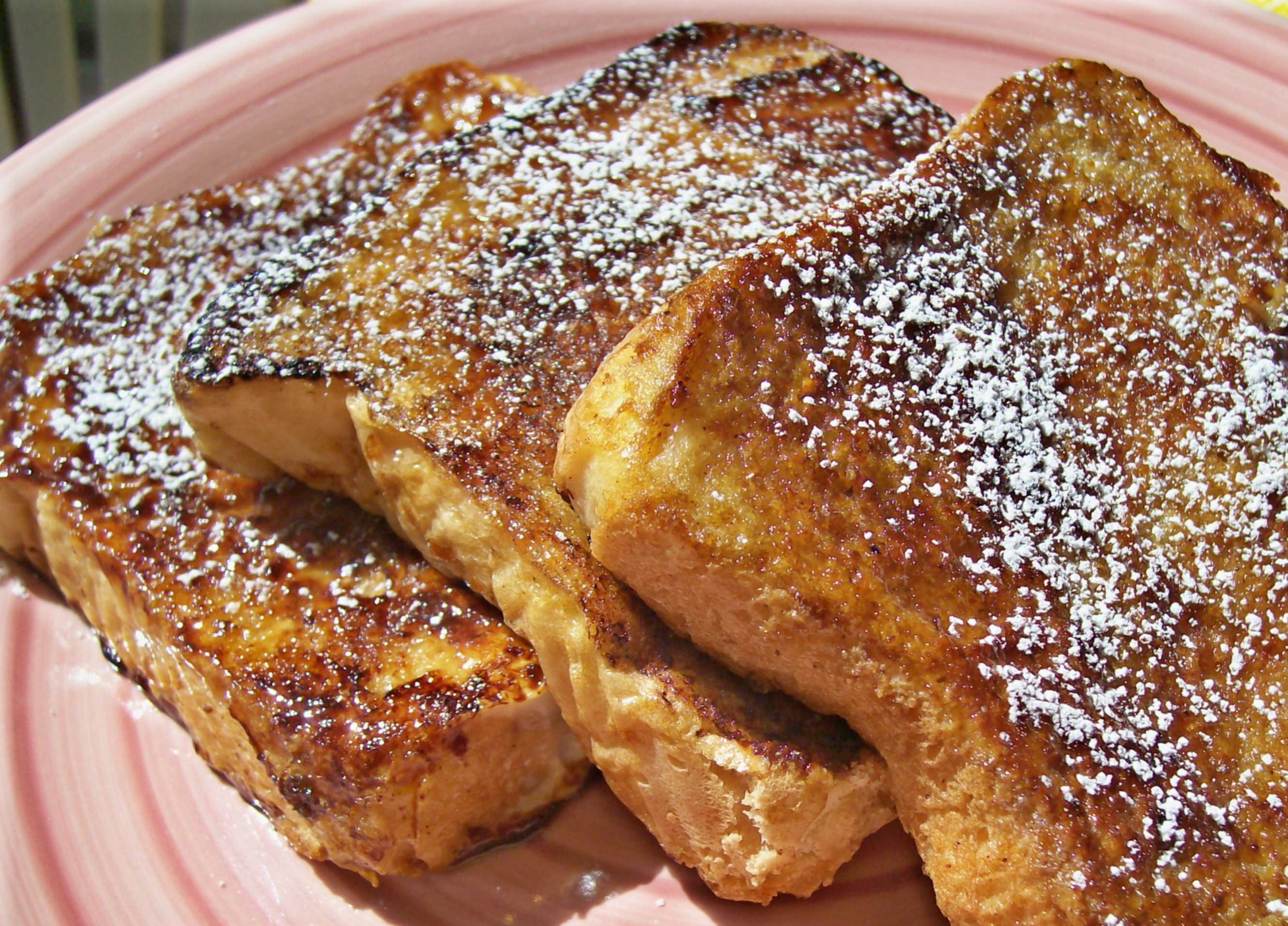We recently discussed the “11 herbs and spices” in Kentucky Fried Chicken. Remember the difference between herbs and spices?

Herbs come from the green, leafy parts of certain plants. Basil, oregano, and mint are herbs; and the 1970s folk-rock duo Simon and Garfunkel included a few others in one of their somber songs: “…Parsley, sage, rosemary and thyme.” (Of course, when we were kids we thought they were crooning about breakfast sausage and the sands of TIME.)
Spices are derived from parts of the plant other than the green leafy bits. Cloves (flower buds), ginger (roots) and pepper (seed pods). And then there’s … CINNAMON. Oh yes, how can we forget cinnamon. To mention that we love it would be an understatement. In French toast, how much cinnamon is enough? Answer: More!
 Are there any songs that mention cinnamon? None we know. But the Bible signifies this aromatic and flavorful spice in several passages. It was included in God’s recipe for holy anointing oil, when “…The Lord said to Moses, ‘Take the finest spices: of liquid myrrh … of sweet-smelling cinnamon … and of aromatic cane … and of olive oil…; and you shall make of these a sacred anointing oil….'” (Exodus 30:22-25 RSV)
Are there any songs that mention cinnamon? None we know. But the Bible signifies this aromatic and flavorful spice in several passages. It was included in God’s recipe for holy anointing oil, when “…The Lord said to Moses, ‘Take the finest spices: of liquid myrrh … of sweet-smelling cinnamon … and of aromatic cane … and of olive oil…; and you shall make of these a sacred anointing oil….'” (Exodus 30:22-25 RSV)
Solomon wrote “I have perfumed my bed with myrrh, aloes and cinnamon.” (Proverbs 7:17 NIV) Other references to cinnamon are found in Solomon’s Song of Songs 4:14; and in Revelation 18:13. We like to think that the Creator of the Universe loved cinnamon as much as we do.
But what’s so special about this particular spice? Well, in addition to tasting and smelling absolutely divine, cinnamon is loaded with fiber and antioxidants, and it contains a unique compound called cinnamaldehyde. These components make cinnamon conducive to good health. Indeed, the spice is known to produce 7 health benefits. (SEVEN!! — Hey, that’s God’s favorite number!) Cinnamon: (1) can lower bad cholesterol or LDL; (2) help treat Type 2 diabetes; (3) has antifungal, antibacterial, and antiviral properties; (4) can reduce the symptoms of Alzheimer’s and Parkinson’s; (5) has anti-carcinogenic properties; (6) has anti-inflammatory properties; (7) and can help manage polycystic ovarian syndrome, or PCOS.
And did we mention it’s delicious in French toast? No wonder cinnamon was once valued almost as highly as gold, and was considered a gift fit for a king … or a god. Cool, right? But times change. So does “stuff”! Not all is as it seems. And not all cinnamon is really cinnamon!
 The English word cinnamon can be traced back to the Hebrew qinnamon, a spice imported to Egypt from India. This is known scientifically as Cinnamomum verum. You may recognize the Latin adjective verum, from which we derive such words as TRUTH and VERIFY (as in “Trust … but verify!”)
The English word cinnamon can be traced back to the Hebrew qinnamon, a spice imported to Egypt from India. This is known scientifically as Cinnamomum verum. You may recognize the Latin adjective verum, from which we derive such words as TRUTH and VERIFY (as in “Trust … but verify!”)
“True Cinnamon” is produced from the inner bark of an evergreen tree that’s native to Sri Lanka. TRUE cinnamon was rare and expensive during Biblical Times. It was delicious, aromatic, and had many health benefits. It’s what God requested be mixed into His Holy anointing oil.
But there’s another spice currently marketed under the name “cinnamon.” It’s less expensive and more readily available. It’s produced from the bark of trees originating in China and now cultivated throughout Asia. Spice manufacturers call it Cassia, to distinguish it from the real deal. Cassia looks like cinnamon, tastes like cinnamon — but contains none of the cinnamaldehyde or antioxidants that promote true health.
To the contrary, Cassia contains massive concentrations of a blood-thinning compound called coumarin. Consuming large amounts of this ersatz cinnamon (as a health supplement, for instance; or maniacally tossed it into French toast batter) can lead to kidney and liver damage.
Who knew that something traditionally prized and sought after, something beneficial and even Biblical, could be replaced with something TOXIC? But again, the same can be said of many things, including the evening “news” and a lot of stuff that gets posted on the internet. So we can no longer accept things at face value.
Nor can we always go by the “label.” This also applies to people — who often aren’t what they seem or proclaim to be. How many of us have learned this truth the hard way? How many of us have trusted someone only to find out too late that he or she had a hidden (and self-centered) agenda? Even the Bible warns us against “wolves in sheep’s clothing.” (Matthew 7:15)

Let’s be clear on this point: Not everyone who calls themselves a “Christian” is truly a follower of Christ. Again, labels are convenient and ultimately can be deceiving. Even Satan sports a misleading label. Many of us (thanks to pop culture) imagine him as this red dude with horns and a pitch fork, but the Bible states, “…Satan disguises himself as an angel of light.” (2 Corinthians 11:14 NLT) Why? Because he is “a liar — indeed, the inventor of the lie!” (John 8:44 Complete Jewish Bible)
In regards to all things, ask the Lord to help you distinguish the truth from the lie. Ask Him to grant you the ability to discern truth from error. And always do a little homework. Ask yourself, “Does this or that line up with the Bible (the infallible Word of God)?”
“Is it nourishing and beneficial? Or is it something spiritually toxic in disguise. Above all, is it TRUE?”
Don’t swallow life’s “cinnamon deceptions.” Jesus said, “Take heed that no one deceives you.” (John 24:4 NKJV) The Lord also said, “Not all who sound religious are really godly people.” (Matthew 7:21 TLB) “The way to identify a tree or a person is by the kind of fruit produced.” (Matthew 7:20 TLB)
